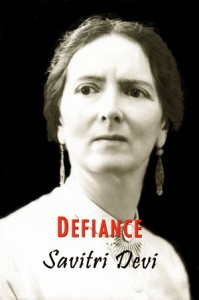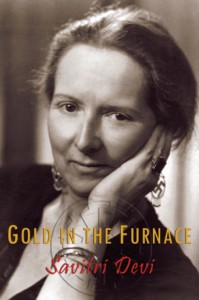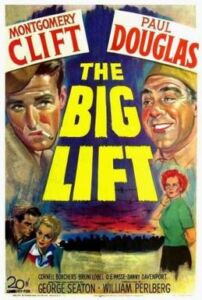Psychoanalyzing the Natives: The Big Lift
Posted By Clarissa Schnabel On In North American New Right | 10 Comments“We are the natives of Trizonesia,” [2] as the singer Karl Berbuer once put into words the feeling in “colonized” West Germany, the three-way occupation zones of the United States, Britain, and France. A film that was produced on that topic is The Big Lift [3] (1950), filmed on the heels of the now famous Berlin Airlift [4] of 1948-49.
Reviewers have made fun of all the technical information the audience is subjected to in it: How does radar work, and how is the ground crew handling all that air traffic? Despite being completely useless when it comes to technical stuff, I don’t mind those scenes at all. There are far more egregious things happening in The Big Lift. Yet, the production’s background story offers a rare glimpse of hope.
For history buffs, The Big Lift is a must. All supporting roles are played by actual American, British, and Soviet (!) military personnel, as well as Berlin citizens. Those guys were not bad actors!
The star of the film is heartthrob Montgomery Clift, supported by Paul Douglas and German actresses Cornell Borchers and Bruni Löbel, as well as O. E. Hasse, the eternal villain, in a darkly comedic role for a change. Everything in it is darkly comedic, really. Danny and Frederica’s (that would be “Friederike”, actually) wild journey through divided Berlin is hilarious — the black marketeer! The coffee smuggler! — but underlying it all is, of course, a catastrophic situation of rubble, poverty, and exploitation.
But let’s start at the beginning. The film opens up dramatically with news footage from Berlin: the Soviets withdraw from the Allied Control Council [5] and start blocking all the city’s entry points. Representatives of the Western Allies arrive for a crisis meeting, culminating in General Lucius Clay declaring that they will not give in to Soviet pressure.
The scene then dissolves into a movie theater for US military personnel. Their enjoyment of a beauty contest on the screen is rudely interrupted by the order for all members of the 19th Troop Carrier Squadron [6] to report to base immediately. Among them are flight engineer Danny MacCullough (Montgomery Clift) and his buddy, the streetwise Hank Kowalski (Paul Douglas). The latter already has his suspicions, and after the meeting that tells them absolutely nothing about where they are going, he approaches his senior officer, asking to be excused from the mission. “I’m not going to do a very good job where we are going,” he hints darkly. Of course, this is denied, so he joins the rest of his unit, who speculate excitedly about their destination. “Didn’t you just watch the news?” Kowalski tells them. “We’re going to feed the Krauts.”
Sure enough, they are bound for Rhein-Main Air Base [7]. There, Kowalski is ordered even further into the thick of the action — right into Berlin proper.
Danny, in the meantime, learns about the mission of the great airlift: get a supply plane onto the runway, wait 20 minutes for it to be unloaded, get out again. Repeat. Indeed, the Berlin Airlift’s logistics and technical achievements are impressive even today. (Should I say, especially today?) The only way for the Western Allies to get to the “island” of Berlin in the midst of Soviet-controlled territory were three air corridors that had been agreed upon before relations with Moscow fell apart. The pilots had to stick exactly to those corridors as to not provoke a military confrontation. All the while, Soviet fighter planes harassed and tried to provoke them. This is actually portrayed in the film. All the supplies needed to feed a city of over two million inhabitants had to be flown in this way. It was an incredibly synchronized and also highly stressful operation. Whatever the politics behind it, I consider it one of the United States’ finest moments, and indeed it was the Berlin Airlift more than anything else that cemented the feeling of friendship between post-war Germany and the US. We can mock that sentiment all day long; there was no “friendship” on the part of the US leadership, to be sure. But in the minds of ordinary people, servicemen and civilians alike, something had changed.
Among the best footage in The Big Lift is the approach to Tempelhof Airport. It’s not artistic license; the planes actually had to fly in that low above the apartment blocks. I spent a lot of time in Berlin Tempelhof when I was writing my biography of Marta Hillers, who lived there in 1948, and yes, the airport was situated right in the middle of a residential area. One false move meant death, and there were of course deadly accidents during the airlift. The most dramatic scene in the film is certainly the depiction of a blind flight and landing during thick fog. No matter what you think about the conduct and the outcome of the Second World War and the world that has resulted from it, there’s a lot to be proud of in the achievements of Western Allied personnel!
Four months later, Danny is still taxiing back and forth between Rhein-Main and Tempelhof airports. A certain degree of “going native” is setting in, as Danny paints the name “Der schwarze Hibiscus [sic]” (black hibiscus) on his plane’s fuselage. His next flight, however, turns out to be a milestone in the history of the airlift: It’s the 100,000th flight to Berlin, and there’s quite a bit of ceremony attached to it. Representatives of the people of Berlin express their thanks to the servicemen. This is how Danny meets Frederica Burkhardt (Cornell Borchers), a young widow whose husband was killed in Russia. Eager to see her again, Danny accepts a reporter’s proposal to star in a “hometown boy story,” and he follows Danny around as he delivers flowers from Rhein-Main to Berlin.
 [8]
[8]You can buy Savitri Devi’s Defiance here. [9]
Danny also meets Hank again, who is now working as an air-traffic controller at Tempelhof Airport and can tell you all about ground-controlled approach (GCA [10]) in the scene that is most mocked of all. Hank’s attitude toward the Germans hasn’t improved since his arrival in Berlin when one of his crewmates, upon seeing the heap of rubble that was the former capital of Germany, remarked, “This place sure caught it.” “Not enough,” Hank replies. “This is where they should have used the A-bomb.”
Hank still shouts at and bullies the German workers, cab drivers, and basically everybody else. “Don’t feel sorry for them, they hate our guts,” he tells the disapproving Danny. “If the situation were reversed, they’d kick our teeth in twice a day.” Still, to Danny’s surprise Hank has got himself a Schatzi, and he invites Danny and Frederica to have dinner with him and Gerty.
Danny finds Frederica at her workplace, clearing away rubble as one of Germany’s Trümmerfrauen [11]. She is happy to see him and accepts his invitation to dinner, but has to do some shopping first, so Danny tags along. This is the reality of post-war Germany: endless queues in every shop. Danny remarks how little food there actually is in the shops, when he compares it to the loads of all the planes coming in. But, as Frederica points out, 70% of the freight is coal to keep Berlin’s electricity flowing.
When Danny unthinkingly throw away his cigarette butt, a worker at a nearby advertising pillar quickly picks it up. Kind-hearted Danny hands out cigarettes to the worker and his colleague up on a ladder attaching posters — only to have a bucket of paste rain down on him as a result.
Frederica takes his uniform to the cleaner, so in the meantime Danny gets to wear the bathrobe of her neighbor, Herr Stieber (O.E. Hasse). Stieber is counting the incoming US planes in his capacity as a Russian spy, he cheerfully tells a bewildered Danny.
Meanwhile, Frederica, who has gone to fetch Danny’s uniform, learns that the cleaner has gone home early, as his son had been arrested by the Soviets. Now Danny and Frederica have to set out to find the cleaner in order to get Danny’s uniform back. It turns out to be quite a quest and is ultimately unsuccessful — but that isn’t the point of it, anyway, which is to make Danny fall in love with Frederica through all their misadventures. He does.
But there is always something dark lurking underneath the surface. When Danny and Frederica pass through the Siegesallee [12], Danny carelessly remarks that the damaged statues “don’t look so Sieges anymore,” eliciting a strong but silent reaction from Frederica.
They arrive at the restaurant where they are to meet Hank and Gerty, and go through the ritual of Verbrüderung: calling each other by the familiar form of “you,” du. Hank and Gerda (Bruni Löbel) — for that is her actual name — show up, and of course Hank is talking right over her.
This scene is worth watching, as ham-fisted and propagandistic as it is. Hank turns psychoanalyst, attesting that all Germans have a father complex (“Papa is the boss”), which of course leads right to Hitler. Frederica counters like a pro: “Yes, I have read about it many times. I’m not sure if it’s true, but if it is, you’re certainly doing nothing to cure it.”
Put on the spot, Hank allows Gerda to speak her mind from then on. So Gerda, confused as she is about what is right and wrong — every paper from every faction is telling her something different — asks Hank the big question: “What is democracy?” It turns out that Hank can’t really answer that question. He waffles about feelings and knowing it when you see it, which of course doesn’t help Gerda one bit.
“If you can’t tell me what it is, how do I know if I like it?” she asks. Hank replies, “Just take my word for it.” I think that is re-education in a nutshell for you.
 [13]
[13]You can buy Trevor Lynch’s Classics of Right-Wing Cinema here [14].
But it gets better. Gerda quotes a Russian soldier as saying that in America a few wealthy men own all the newspapers, and through them tell the people what to say and what to think. Ouch.
Their interesting exchange is interrupted by military police asking to see their papers. Danny, who is out of uniform, of course has to quickly make his escape. Meanwhile Hank, in another ham-fisted scene, has spotted a familiar face among the patrons and follows the man outside. He turns out — what are the odds? — to be Hank’s tormentor from his time as a Polish-American prisoner of war in a concentration camp. Yes, there were Allied prisoners of war in Auschwitz, if you can believe it. But they were not mixed in with the “normal” camp inmates.
Danny stops Hank from beating the guy to a pulp, at which point the military police get involved again. And once again, Danny and Frederica have to go on an adventure. They flee through the nearby Brandenburg Gate right into the Soviet sector, where the MPs can’t pursue them. More absurdities follow when Soviet and British soldiers have to establish where the border between their respective zones runs so they can agree on who is going to arrest Danny and Frederica. (The couple escapes in the confusion.)
Hank and Gerda make their way to Stieber to wait for their friends. Hank is messed up. Seven years he has waited to get his hands on the guy, he tells Gerda, so why does he feel so dirty all of a sudden?
When Danny returns to Berlin the next time, Hank has bad news for him. Never having trusted Frederica for a moment, he has dug up some dirt on her. Contrary to what she had told them, her dead husband had (of course!) been in the SS; her mother had been Polish, so (of course!) her father walked out on them in 1939.
Danny confronts Frederica. This scene is another important one. Up to now, life in Berlin had been portrayed with a kind of absurd humor that Berliners actually would have appreciated. But now we get to see the dark side of post-war life. “When you live in a sewer, you soon discover that the sewer rats are best equipped to survive,” Frederica explains tiredly. “Look around you, Danny. That is why we lie.”
For the first time, a distraught Danny actually does look around. He witnesses children picking through rubble. There is an old crippled woman in rags. A bridal couple on a bike are making their way to a church surrounded by ruins. People are living in a small wooden carriage on the streets and are searching through a trash can for kitchen scraps.
Danny applies for permission to marry a German civilian. Charmingly, his superior officer tells him that he has learned not to grant those kind of requests at 8:30 AM because they usually get cancelled after a few hours. But as Danny had been on duty the night before, he makes an exception.
Stieber, who delivers Danny’s letter about their upcoming marriage to Frederica, also picks up a letter to her from one Ernst Mirbach in St. Louis. The audience already knows that Frederica claims to have friends in St. Louis who have sent her clothes and told her about life in the US. But (of course!) there is something sinister about all of it. Stieber watches Frederica discard Danny’s letter without a glance and she instead focuses on the letter from St. Louis, which contains a photo of a handsome man standing proudly in front of his shop.
Danny is to return home sooner than expected, so he makes his way through a dense fog to Berlin to marry Frederica. Hank and Gerda are to be the witnesses. When Hank goes to fetch Gerda, however, she has just had a revelation. She has discovered America’s founding documents, and in a grand scene now kicks Hank’s ass for bossing her and her countrymen around. Bombarded by the tins of spam and packets of soap he has bought her company with, Hank beats a hasty retreat, congratulating Gerda on having become a citizen.
In the meantime, Frederica writes to Ernst Mirbach in St. Louis. Stieber, who has his suspicions, offers to take the letter to the post office. Opening it, he discovers Frederica’s nefarious plan: She intends to marry Danny in order to get to the US, stay married to him long enough to be guaranteed the right to remain, and then get a divorce so she can marry Ernst.
The big showdown takes place at the town hall. Danny is completely destroyed by the revelation; Hank and Gerda are disgusted. “I hope you get out of Germany,” Gerda tells Frederica, and Hank adds, “I hope you don’t. We don’t need you, either.” Yet, Gerda understands how Frederica arrived at this mindset. For years, Germans had been told that only the end is important, no matter how you get there. There had been not enough time to unlearn this lesson. She tries to explain all of this to Danny, but when he asks her whether she’ll emigrate to the US, Gerda declines. “I want to see the right kind of Germany,” she tells him, determined to soldier on for the future of her country. “When all the ones who want something better look for it somewhere else, what happens here?”
 [15]
[15]You can buy Savitri Devi’s book, Gold in the Furnace, here. [16]
Hank comes to the realization that he actually likes it in Germany and makes his assignment permanent. The film ends with the German workers, whom he starts to treat rather benignly at last, telling him that the blockade has been lifted.
There is a lot to unpack in this, of course. The uneven portrayal of Frederica is perhaps the most glaring thing that needs to be addressed. We never learn who Ernst Mirbach actually is and how his connection to Frederica came about. Obviously, they are in love and want to marry, but that aspect is swept under the rug in order to portray Frederica as devious and dishonest. Yes, her treatment of Danny is abominable, but the audience is never told that, thanks to the Morgenthau Plan, there is no way for her to legally emigrate to the US other than as a war bride. And yet we get the remarkable scene of Frederica very honestly and vulnerably asking Danny what he expects from her and her countrymen under the present circumstances.
If you know what to look for, you can see where the script has been rewritten, and that is one of the little-known background stories of the production. Bruni Löbel, who starred in The Big Lift in her first international role, revealed in her autobiography [17] how different the script still looked when she signed on — before having read the script, actually, which became the turning point for the rewriting process. She described her dismay at discovering how negatively both Frederica and Gerda were portrayed in the script; they were practically the same person — greedy, lying, and cheating, with no redeeming qualities whatsoever. This also extended to all the other German roles in the script. Unwilling to go along with it, Bruni Löbel went to director and scriptwriter George Seaton and his wife Phyllis and told them she had to break the contract. Here’s my translation of what she had to say about it:
Seaton was stunned when I told him that I couldn’t play this role, even if I had to pay off the high penalty for years; but a miracle happened: The Seatons wanted to know my exact reasons and arguments, and I in turn wished to know on which information and research this script was based. The Americans living here had provided most of the suggestions and descriptions.
If you’d like to speculate which Americans we’re talking about, read Seaton’s Wikipedia entry [18]:
Unfortunately, no contact had been made with Germans. — I could always arrange that, I said, and soon brought the Seatons together with young and older Germans. Now the material was beginning to get really interesting, Seaton said. . . .
The unbelievable result of all these conversations was that George Seaton had the already initiated filming canceled and flew back to Hollywood to produce a corrected script based on his new findings.
To be honest, it would have been a much poorer film without those changes. This way you have character development, and you have a message. Bruni Löbel would even travel to the US for the premiere, which in 1950 was a big deal. The Americans welcomed her warmly, possibly because she was very exotic to them. “A real-life specimen of those Germans we keep hearing about in the news (and she doesn’t even have horns)!”
Thus, the story behind the film is even more interesting than the film itself. In fact, the film tells us a lot about the people behind it, which I always find illuminating. We get the usual “How the US sees Germany and Europe without really knowing much about them.” It never fails to aggravate and amuse me. And of course National Socialism and Prussian values get mixed up again. (Might have been because of that monocle-wielding stereotype of Hollywood make.) But those are minor issues. All in all, The Big Lift is a very enjoyable film.
Ironically, without Bruni Löbel’s input the old script would have been very much out-of-date — and that is because of the very Berlin Airlift the film portrays! In 1948 a political shift started away from the “evil German” propaganda of the war years and the “re-education” hype, both themes that still feature partly in the rewritten version. Slowly, the Western Allies came to realize that a) their Morgenthau approach was having exactly the effects its critics had foreseen, i.e. starvation and misery across the continent because Europe’s powerhouse, Germany had been taken out; and b) they needed their formerly evil enemy on their side against their formerly good ally, the Soviet Union, because — yeah. Who could’ve seen that coming? And so things got a little more relaxed, shall we say. But you cannot undo years of propaganda in a day, and thus it was not only the Germans who had to be reprogrammed, but the citizens of the West in general.
The Big Lift, in its rewritten form, fit right into the new narrative: Germans: well, sort of ex-evil but coming around; Americans getting to know them better; and Soviets as distrustful and restrictive, but kinda silly and easily fooled.
